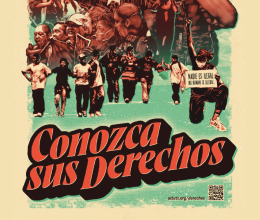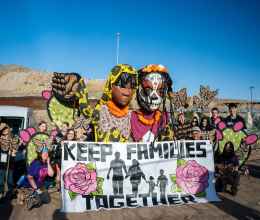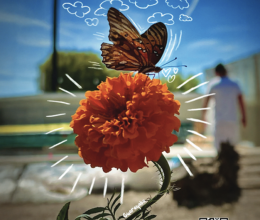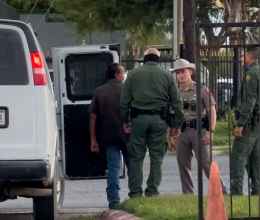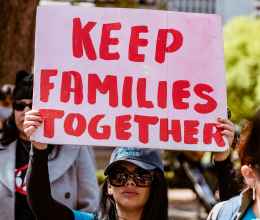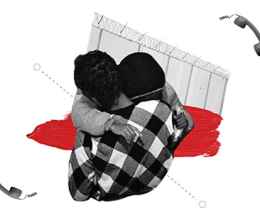
This post originally appeared on the San Antonio Current's website.
Jose A. “Fito” Salinas is sitting with me in his air-conditioned truck in La Joya, Texas, talking on a Sunday morning that’s already reached 95 degrees. Just across from us is a cyclone fence, and beyond that, two local baseball teams who are going at it, complete with screaming fans. The players look to be in their thirties, maybe forties — Salinas is pushing 80.
“I used to play professionally,” he comments, just as a batter hits a good one. “Thwack!” goes the ball. “Bueno-bueno-BUENO-GUEYYYY!,” roars the crowd. Salinas glances through the fence. “I played for the Houston Colt 45s,” he says, “back before they became the Astros.” Another thwock, then high female screams and shrill male whistles. “And that’s why the La Joya team is named the Colt 45s.”
With his barrel chest, grey mustache, and a Stetson hat parked on the truck’s dashboard, Salinas resembles an elder-statesman cowboy. He’s actually the mayor of La Joya, a matchbox-sized municipality in deep South Texas, population pushing 4,300. The town is an antique, former ranching community two miles from the Mexico border. English is rarely heard in this area of the United States. Spanish predominates, and so do serious games that involve kicking rather than batting. Even so, La Joya is less a soccer town than a baseball town — almost fanatically so.
It’s also a town that’s taking steps to help much larger cities, including San Antonio, Houston, Dallas and El Paso, to sue the State of Texas to rescind Senate Bill 4. Dubbed by opponents as the “show me your papers law,” SB4 was signed by Governor Greg Abbott in May. If an injunction doesn’t stop it, the law will take effect on September 1. Then Texas police officers, sheriff’s deputies, and constables will be allowed to ask about the immigration status of anyone they stop, even for trivial traffic infractions. Police chiefs and other authorities will be punished if they forbid their employees from doing this kind of questioning. And after the questions are asked, the Border Patrol and ICE can be called.
La Joya is not a plaintiff in the anti-SB4 lawsuit brought last month to federal court in San Antonio, seeking preliminary injunction to keep the new law from taking effect. But as the suit moves forward, several cities and towns, including La Joya, are considering participating – or have already decided to do so – as amici curiae (that’s legalese for “friends of the court.”) Though not plaintiffs, they assist a court by offering new arguments or information that bear on the case. American Civil Liberties Union attorney Edgar Saldivar, who represents a number of the plaintiffs, says he believes the federal judge will make a ruling on the preliminary injunction by the end of this month, before SB4 is set to go into effect. Though it’s unclear how things will shake out, it’s possible that the court will put some of SB4 on hold, while allowing other portions to take effect. One way or another, Saldivar says, expect an appeal to the Fifth Circuit Court of Appeals, from the state or the plaintiffs. When that happens, “friend of the court” filings from communities like La Joya could play a key role in the fate of SB4.
And the plaintiffs’ filings will be equally important to communities like Mayor Salinas’ little town. SB4 opponents believe the law will fall especially hard on border communities like La Joya. Ninety-eight percent of the residents here are of Mexican ancestry, and in surrounding Hidalgo County, an estimated one in six or seven people is undocumented. Fear abounds about a racial-profiling, SB4 witch hunt against these Texans and their families, who typically include U.S.-citizen spouses and children.
Mayor Salinas worries about SB4’s possible effect not just on La Joya’s residents but also on their baseball. Last November, he and his constituents got an up-close preview of what might happen if the law were to be enforced in the middle of a ball game.
It was another Sunday morning, days after Donald Trump’s election. Salinas had politicked for a long time to rebuild La Joya’s muddy, decrepit sports park, and on this day his efforts were being rewarded. The community was debuting hundreds of thousands of dollars in improvements: new grass, a fastidiously laid-out diamond, and barbecue pits for players and families to use after games. The mood was celebratory, and an inaugural game was in progress. Salinas lorded over a grill, barbecuing.
Suddenly, a squadron of Texas Department of Public Safety and U.S. Border Patrol vehicles drove up. Border Patrol agents entered the park, strode to the bleachers, and began questioning a woman in the stands (her husband was on one of the teams playing). As people looked on in shock, the agents led the woman away, along with her 6-year-old son.
Salinas’ daughter Frances, who runs the town’s housing authority, was there — and she was furious. She had a video camera, and her recording of the incident went viral. Meanwhile, the feds issued a press release claiming the woman had been spotted at the Rio Grande River, over a mile away. Surveillance photos and witness accounts later emerged, showing that, in fact, she’d been at the game and only briefly walked just a few feet away, to take her son and some other young children behind a bush to use the bathroom. Images of the bathroom break had been captured by a DPS camera hidden just outside the ballpark (it’s one of 5,000 such secret cameras stashed along the border). The images of the woman and kids had been transmitted hundreds of miles away, to a DPS office in Austin. There, analysts, apparently unaware of the nearby baseball park and possibly the nearby town, told the Border Patrol to go investigate.
La Joya was traumatized. It still is. Now, on a Sunday morning months later, the mayor explains why.
“Baseball has always been a big thing here,” Salinas says. “When I was in high school in the 1950s, we hardly had anybody that could beat La Joya. Today,” he adds, gesturing proudly toward the field, “you’re seeing two teams from this area, playing for a league. La Joya’s Colt 45s just won the league championship.”
As Salinas tells it, five decades before this morning’s conversation, he had just finished college when he signed with the Colt 45s in Houston. A few years before that, he’d been a migrant farmworker, along with the rest of his family. That’s when he first experienced frank racism. “In 1957, when I graduated from high school, we went to pick cotton in Lubbock,” he reminisces. “I was 17, and I asked the trucker who took us there to take us to a restaurant to eat. Got into the restaurant and they said ‘Hey, get out of here — no Mexicans. If you’re going to eat, get in the back. There’s a table outside.’”
A few years later, after playing ball for Houston, Salinas signed with a team in Puebla, Mexico. Later, he abandoned professional baseball, returned to his studies, and became a schoolteacher, then an education administrator, where he experienced more racism. “In 1970 I went to Crystal City, Texas as a high school principal,” he said. “The Hispanics there had to see the movies on the balcony — they could not sit with the Anglo-Saxons on the lower level.”
Another crack rings out, and more bueno!-bueno!-bueno!s, as the batter sprints to first.
“And here we are,” Salinas muses. “Fifty years afterwards, and we have another law coming down on us now. What do you think SB4 was made for? What’s its sole purpose?”
The question is rhetorical. Salinas says he thinks about schools — and automobiles — when he thinks about the cruel, racialized zeitgeist that has created SB4.
“It’s coming from President Trump saying we’re going to run off all the Mexicans that are criminals, deport them. I was an educator for 35 years. I compare SB4, and those criminals Trump wants to get rid of, to a classroom. If a teacher has 30 students and two are troublemakers, are you going to punish the whole classroom, the other 28 kids, because of two kids?” Salinas asks. “No, you’re not. But to me this is what’s happening, and what’s going to happen, with SB4. You’re going to punish—to stop—all the cars that come through here. Because the majority of the drivers are Hispanics.”
On the other side of the fence, the pitcher throws and the batter stands stock still. “Hit the ball, bro,” a fan mutters, in English.
Salinas adds that, daily, 48,000 cars pass east and west on US Route 83, La Joya’s main drag. With SB4, he says, “All my police officers are going to be doing is stopping 48,000 cars to ask if you’re illegal or not.”
“We have only 12 police officers,” he says. “Currently, we do not ask any individual for their papers, or if they’re citizens or not citizens of the United States. Our police are not immigration officers. Our police serve and support our people. We don’t want to do immigration work.”
Salinas recalls the morning when the Border Patrol agents arrived at the ballpark.
“I thought they were going to come over and eat some chicken at the barbecue pit. But, no. One walked in and I said ‘Sir, can we help you? What can I do for you?’ He didn’t even talk to me — he just went on.”
Border Patrol agents marched the woman and her little boy out of the ballpark and transported them to a detention center. This happened at 10 a.m., and Salinas immediately called the teams, and their remaining fans and children, together to try to comfort them. “No se sientan intimidido,” he exhorted: “Don’t feel intimidated.”
“No tengan miedo. Vamos a seguir adelante! No se rajen!” “Don’t be afraid. We’ll keep on going forward! Don’t get discouraged!”
His words didn’t help much. “At 2 o’clock another two teams were going to come,” Salinas remembers. “And when the other two teams found out about the incident, they didn’t show up.”
For months afterward, games were often canceled because teams didn’t come to the ballpark when they were scheduled to. They’re back now, but family and fan attendance is greatly reduced — leaving the bleachers almost empty. The mayor nods in their direction: “The one you’re looking at where there’s only two people sitting? It and the other bleachers were full before, and there were people sitting on the side with their own lawn chairs. The other bleacher behind the backstop — it was full also. And all through the side here were people sitting in lawn chairs.”
“We don’t have that crowd now,” Salinas sighs. “It’s all because of what DPS, and mainly the Border Patrol, did. The parents and the kids are afraid. It’s just terrible.”
The game reaches the seventh-inning stretch and Salinas needs to attend to other things on a Sunday besides baseball. We ask if, before he leaves, he can introduce me to the Colt 45s. I hesitate to approach them cold; I worry about their fear — especially nowadays, with SB4 looming. “Sure,” Salinas says, and leads me to the dugout. “It’s OK to talk to her,” he tells the players, and they nod. They may worry about strangers asking questions, but they trust their mayor.
